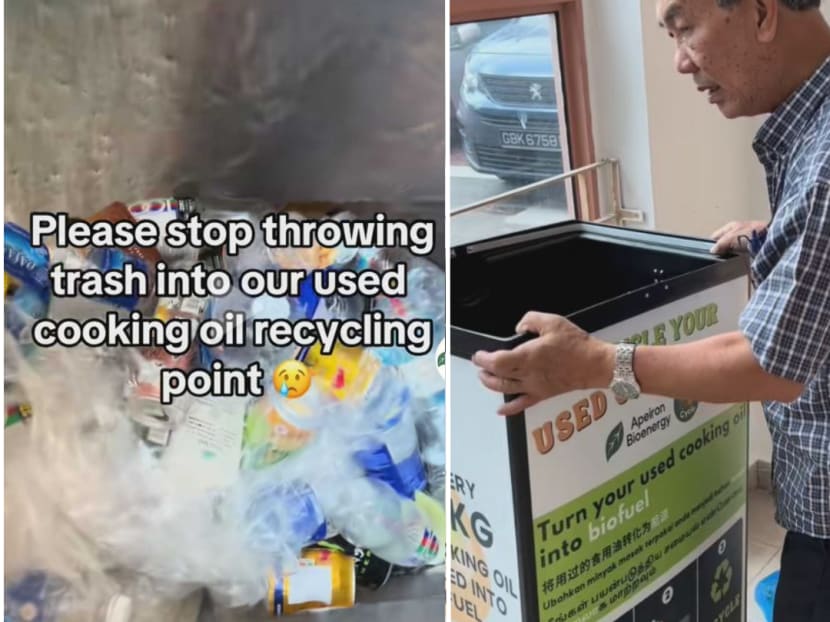Soiled nappies instead of used cooking oil: Biofuel firm urges public not to dump trash into recycling bins
SINGAPORE — Biofuel company Apeiron Bioenergy has appealed to Singaporeans to stop throwing trash into its bins, which are meant for collecting used cooking oil.

Biofuel company Apeiron Bioenergy put out a TikTok video on July 18, 2024 showing an employee sifting through various trash items such as plastic bottles and empty drink cans in its collection bin.

This audio is AI-generated.
- Biofuel company Apeiron Bioenergy took to TikTok to appeal to the public to stop throwing trash into its used cooking oil recycling bins
- At one of its collection sites, up to 90 per cent of the bin was filled with rubbish such as used nappies and plastics
- The company said it plans to further refine its bin designs and increase community engagement
- It is also seeking new community partners and town councils to expand the availability of recycling points for used cooking oil
SINGAPORE — Biofuel company Apeiron Bioenergy has appealed to Singaporeans to stop throwing trash into its bins, which are meant for collecting used cooking oil.
In a bid to address this growing problem, it used its TikTok account recently to spread awareness and urge the public to properly dispose of their waste, to ensure that the cooking oil collected remains uncontaminated and fit for recycling.
The 25-second-long clip, with the caption "Please stop throwing trash into our used cooking oil recycling point", features a company employee sifting through the waste in the bins, which contained things such as plastic bottles, empty drink cans and plastic bags.
The video has since been viewed more than 250,000 time and received more than 190 comments, with many people lauding the company's efforts.
Some suggested ways to mitigate the problem, such as changing the design of the collection bin so that the public would not mistake it for a general waste recycling bin.
90 PER CENT OF BIN FILLED WITH RUBBISH
In response to TODAY's queries on Friday (July 26), the company said that it started what it called "The Oil Cycle" initiative in 2022 to collect used cooking oil from households.
The initiative involves setting up recycling bins in the community, and conducting outreach efforts to encourage residents to deposit their used cooking oil at these designated bins.
The company said that since used cooking oil was a "niche and dirty recycling item" that does not get enough resources and attention, it took several months for the company to get buy-ins and approvals from its partners to set up the recycling points.
In the past four months, the company has rolled out four collection points across Singapore:
- Vidacity community complex in Pasir Ris
- City Sprouts Henderson, an urban farming space along Henderson Road near Redhill
- Block 40 Cambridge Road, a public housing block in the Farrer Park-Jalan Besar district
- The Land Transport Authority's first Biodiversity Training Centre near Turf Club Road
At one of its collection sites, up to 90 per cent of the bin was filled with rubbish such as used nappies and plastics.
The company did not reveal which site this was.
"We collect and monitor the bins biweekly, including tracking contamination rates and volume of waste to ensure we learn and improve the recycling design and methods along the way," the company added.
In response to TikTok users' suggestions for it to improve the design of its collection bins, it said that the feedback has "provided valuable insights into the public's perceptions".
The company has updated the bins' design to include clear signs that read, "Used cooking oil recycling".
"We plan to refine our bin designs by simplifying the information displayed and increasing community education efforts," it added.
STATE OF OIL COLLECTION IN SINGAPORE
The National Environment Agency's website shows that there are 23 licensed collectors of used cooking oil in Singapore.
Apeiron Bioenergy itself said that grease and oil account for 73 per cent of sewer blockages in this country.
"From speaking to some town councils, we understand that they spend around S$150 (on each) hawker centre biweekly to unclog their sewers as a prevention mechanism to prevent used cooking oil and grease from causing blockages," it added.
For now, the company is seeking to promote the recycling of used cooking oil in order to produce biofuels, which is crucial to the aim of Singapore's aviation industry of having sustainable aviation fuel make up 1 per cent of all jet fuels by 2026.
"We are actively seeking new community partners and town councils to expand the availability of used cooking oil recycling points," it said.









